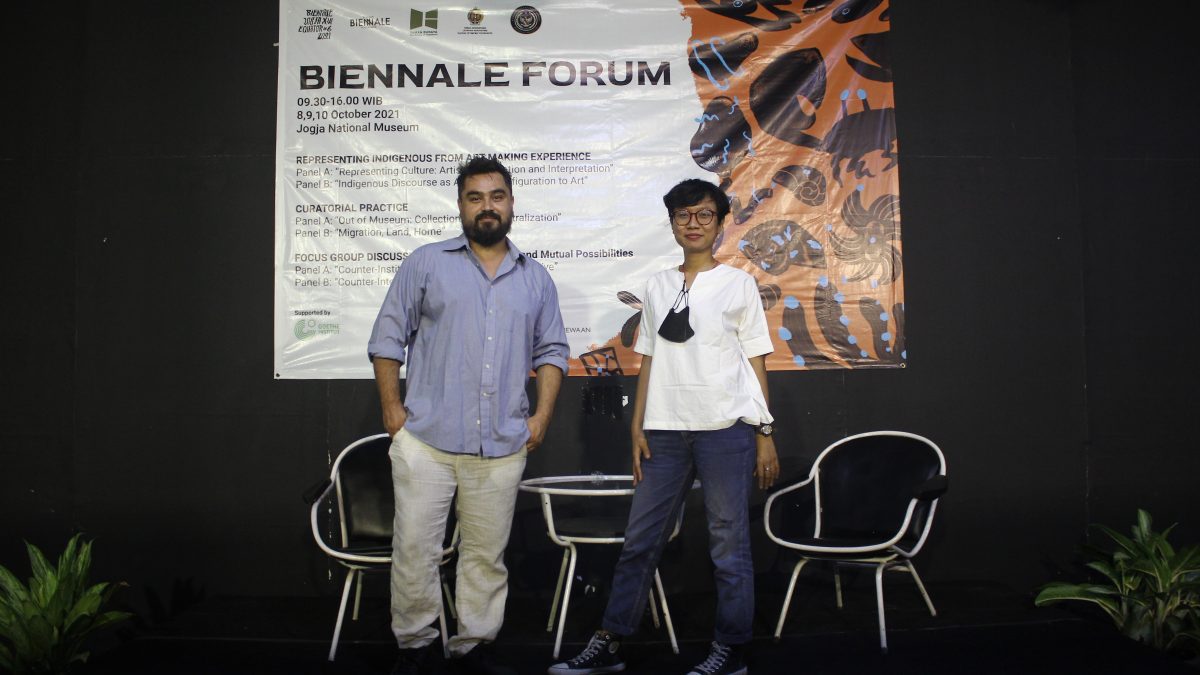
In addition to the moderator, Lisistrata Lusandiana, there’s also Mumtaz Khan Chopan on the podium, an artist from Afghanistan who was also involved in the Biennale Jogja XVI Equator #6 2021. During the Biennale Forum discussion on Saturday (9/10) afternoon, the attendees of the Zoom Meeting were Bunga Siagian (art researcher from the Land Studies Agency, Jatiwangi Art Factory), and Greg Dvorak (Professor of Pacific and Asian History Cultural Studies, Waseda University) as speakers.
The discussion that raised the topic of curatorial practice in the framework of “Migration, Land, Home” was carried out in a hybrid manner, namely offline at Pendapa Ajiyasa Jogja National Museum (JNM), and online via Zoom Meeting.
After the moderator explained in detail the context that would be discussed in the forum, through a projection screen, Bunga Siagian was the first to deliver her presentation. She explained about the work of the Land Study Agency (BKP) using an artistic approach in dealing with land issues in Wates, Jatiwangi.
“Even though the Jatiwangi people’s houses have been established since the beginning of Indonesia’s independence, they still have no clear land ownership status. In the past, the land was taken by the Japanese. Post independence, it was taken over by the TNI and not returned to the community,” Bunga explained.
Armed with a mythical narrative and collective memory, she and the Wates community recreate the memory of their land by planting black rice. Because of that, then new rituals emerged, such as worship in the middle of the rice fields, the planting of selawat, and the celebration of the harvest season every year. Everything was followed by the community with enthusiasm. The land slowly became a new cultural space.
“Several times there have been discussions about the Indonesian Air Force establishing a post on the land. Although not yet realized. We use the land as a cultural area. On that land, we cultivate black rice with an organic approach. The method is supernatural farming,” added Bunga.
After Bunga, Prof. Greg also contributed his opinion on regional issues: how to interpret archipelagic land in the unity of the sea.
“The land is so important for the people in the pacific as well. But I also think it’s important to understand that land is also deeply connected to the ocean and to the sky, to the heavens, and to connections between places, between history, between legacies, it’s all about relationality,” said Greg.
He said the land is a relation to place, history, and the collective heritage of society.
From Greg, the moderator directed the next material to Mumtaz. As an Afghan who has traveled far from his homeland, he feels migration itself is an attempt to reach home. He quoted a poem by Abdul Qadir Bedil, an Indian poet, about the meaning of home for refugees.
“We are the displaced soil from the flood of madness our hearts carry the wealth of a hundred runes,” said Mumtaz, seeing migration not only as a displacement of places, but also a transformation of history and people’s memories.
As a closing statement, after the question and answer. Mumtaz remembered what his sister had said about what home means for them.
“What home is for my little brother, who is mentally disabled, whenever he asks my mom, “when will we go home?” for him, home is a bag of rice and his fabric blanket.”